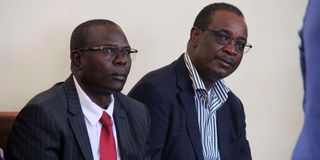IEBC official: I didn't inflate Gladys Wanga’s votes in August 2022 polls

Dr Evans Kidero (right) and his August polls running mate Elijah Kodoh follow court proceedings in October in the case in which he is challenging the election of Governor Gladys Wanga.
An electoral commission official has defended the agency against claims that its officials inflated the figures used to declare Homa Bay Governor Gladys Wanga the winner.
Mr Frederick Apopa, an Independent Electoral and Boundaries Commission (IEBC) manager in the county, said it is normal for figures used to declare results and votes cast for each elective seat to vary. He attributed this to mistakes made by voters.
Former Nairobi Governor Evans Kidero has challenged the election of Ms Wanga. In his petition, he claims there was an alteration of results in forms 37A, which were used to declare results at polling stations. He claimed that the tally used to declare Ms Wanga the winner was also “cooked”.
According to Dr Kidero, failure to have corresponding figures in four elective seats – president, governor, senate and woman rep – means the figures were “manufactured”.
“I verily believe to be true that this difference in the number of votes cannot be accounted for as every voter was handed six separate ballot papers with regard to the six elective posts,” reads the petition. “...the differences in total votes cast for the senator are astoundingly more than the ones cast for gubernatorial (seat).”
He argued that there are serious and glaring inconsistencies in the number of votes cast and that there were more votes cast than voters identified by the Kenya Integrated Elections Management System (Kiems) kit, implying that there was vote inflation and potential ballot stuffing.
Mr Apopa, who appeared before the court yesterday, was asked to explain why there were inconsistencies in the total number of votes cast, which showed that the total number of ballots cast in the governor position were more than those cast in the presidential race.
“Some voters, knowingly or unknowingly, put ballot papers in the wrong box. That is why there is a difference in the total number of votes cast for each elective seat,” he explained.
He also said that the number of who vote cannot be more than the number of those identified by the Kiems kits.
The IEBC official was further challenged to explain why a vehicle that allegedly had unmarked ballot papers was seen around Shauri Yako polling station on election day, leading to suspicion of the integrity of the voting process.
“It was a rapid response vehicle that was deployed to check on the voting process,” he explained.
On whether Mr Apopa could change the results declared at the polling station, he said he relied on information given to him by his juniors and after the forms were provided to him at the county tallying centre, he had counterchecked them through a computer system.
“I picked what each candidate got and put it in the system, which automatically corrects mistakes,” Mr Apopa said.
He also defended the electoral commission against claims that Dr Kidero’s supporters who could not vote on their own were not being assisted, yet those who supported Ms Wanga were offered help.
He explained that voters who declared that they could not vote on their own were required to have their ballots marked in the presence of all agents at the station and the process was made public.
“Some had people to assist them. In such cases, the process was secret,” Mr Apopa said.





